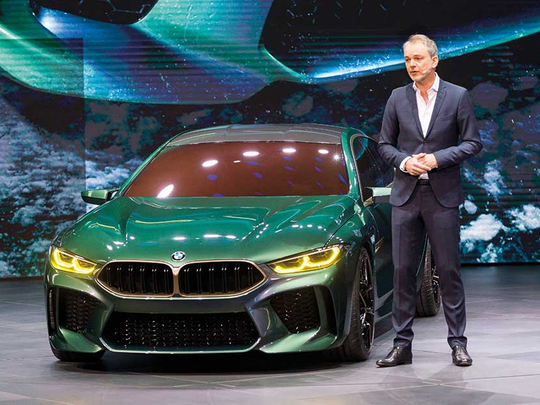
Geneva: As the auto industry prepares for an age of zero emissions, it’s the flashy coupes and gas guzzlers that will pave the way.
At the Geneva International Motor Show this week, BMW AG unveiled the high-performance M8 Gran Coupe concept, and Daimler AG’s Mercedes-Benz showcased the AMG GT four-door coupe, sporting a V-8 engine that emits more than twice the amount of carbon dioxide allowed under European Union fleet rules that come into force in 2021.
The irony is it’s these old-school models that generate the money needed to meet tighter environmental standards. That’s prompting the German brands to squeeze into the small, but lucrative segment of luxury four-door sports cruisers, with the Porsche Panamera and Audi A7.
With price tags that can easily surpass $100,000, the cars are great for families like the Kardashians or the Beckhams but remain out of reach for most consumers. Even at the risk of cannibalising one another, the lure of easy cash is hard to pass up at a time when spending pressure is mounting.
Family sports car
“The market for high-end, high-performance four-door coupes will get significantly more crowded,” said Tim Urquhart, an automotive analyst with market researcher IHS Markit. “They are high-value models aimed at boosting margins and brand prestige” and have proved “popular with sports- and supercar owners who need a four-door when they start a family.”
BMW already offers the $81,400 6-Series Gran Coupe, and Mercedes has the $75,150 CLS, but both are pushing further upmarket with the new models to generate the money needed for investing in electric robo-taxis that are in the industry’s future. Munich-based BMW estimated in January that development spending will rise to as much as 7 per cent of sales this year, from a typical level of about 5 per cent.
The urgency to ramp up technology investment has intensified as consumers shun profitable and fuel-efficient diesel models. The trend, accelerated by the threat of driving bans in the aftermath of Volkswagen AG’s emissions-cheating scandal, threatens to blow a hole in strategies to reduce emissions of greenhouse gas CO2. German luxury brands are particularly exposed because diesel’s efficiency makes a bigger impact on the emissions of their big sedans and SUVs.
BMW, which showed a pre-production version of the M8 in Geneva, said it will unveil the final vehicle next year. The company is in the midst of its biggest roll-out of new models and variants in its history, and the push is skewed toward higher-margin products to help pay for a shift to bring out 12 battery-powered cars by 2025.
The M8 will ultimately be available in three versions: a two-door coupe, a convertible and the four-door. There’s no decision yet on offering the vehicle as a plug-in hybrid, “but what we have said is that it won’t have anything less than 600 horsepower,” BMW spokesman Bernhard Santer said.
“We do plan to electrify the M line-up, but the vehicles must maintain their ability to go on the racetrack,” he said. “Weight plays a big role there, so we need to balance those decisions with battery technology.”
Performance-driven parents
At the show, crowds gathered around the fenced-off vehicle as it slowly swivelled under flashing spotlights and pacy music. Over at the Mercedes stand, the matte blue GT coupe was clearly the star of the display of the AMG performance unit, surrounded by tripods and journalists taking turns sitting behind the wheel. Mercedes said the four-door coupe will be offered as a plug-in hybrid.
“Above all, this is a family car,” said Dieter Zetsche, chief executive officer of Mercedes parent Daimler. “But it’s not only here to be nice. This is for performance-driven moms and dads.”











